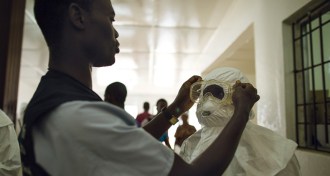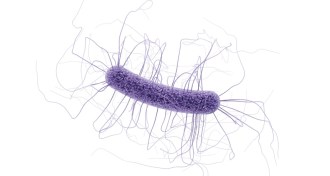Health & Medicine
-
 Health & Medicine
Health & MedicineThe debate over spanking is short on science, high on emotion
Spanking to discipline a child sparks heated debate that reflects deep divides in our society. Studies generally show negative effects of spanking, but there are many caveats.
-
 Health & Medicine
Health & MedicineMore than 1 million Ebola cases may hit West Africa by January
New projections of the outbreak suggest that without drastic improvements, weekly cases could increase from hundreds to thousands.
By Nathan Seppa and Janet Raloff -
 Health & Medicine
Health & MedicineGrowth in diabetes diagnoses starting to slow in U.S.
The percentage of the population diagnosed with diabetes and the rate of new cases per year rose sharply between 1990 and 2008 but haven't grown quite as quickly between 2008 and 2012.
-
 Health & Medicine
Health & MedicineStatins may improve odds of surviving a bleeding stroke
Common cholesterol-lowering drugs called statins may help people who have suffered a stroke caused by ruptured blood vessels.
By Nathan Seppa -
 Neuroscience
NeuroscienceDyslexic brain may solve some math problems in a roundabout way
Children with dyslexia rely heavily on right brain to do addition problems.
-
 Science & Society
Science & Society‘Fantastic Lab’ recounts battle against typhus, Nazis
Arthur Allen explores how two European scientists produced typhus vaccines during World War II.
-
 Life
LifeThoughtful approach to antibiotic resistance
Changing how people think about antibiotics is already showing promise in reducing antibiotic use and costs. It’s doubtful, however, that any single strategy will be enough.
By Eva Emerson -
 Health & Medicine
Health & MedicineDoctors enlisted to turn the tide on antibiotic resistance
Antibiotic stewardship requires education, diligence, and changes in prescribing. At some hospitals, it’s beginning to halt a dangerous trend.
By Nathan Seppa -
 Health & Medicine
Health & MedicineNot all the ‘baby friendly’ rules are rooted in science
The Baby Friendly Hospital Initiative has a noble goal of encouraging breastfeeding, but some of its recommendations may be based on shaky science.
-
 Health & Medicine
Health & MedicineObama takes aim at antibiotic resistance
The White House offers an incentive for better diagnostics and calls for new meds and more stewardship programs against antibiotic resistance.
-
 Health & Medicine
Health & MedicineRounder waists show obesity continues to rise
The waistlines of U.S. adults continue to expand, running counter to a report that obesity, based on body mass index, did not increase substantially in the past decade.
-
 Health & Medicine
Health & MedicineSleep drunkenness might be common
A new survey shows that about 15 percent of people sometimes wake up disoriented and confused, a condition called sleep drunkenness.